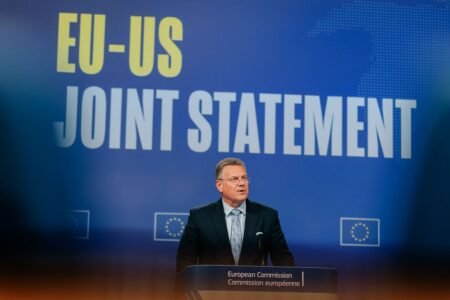(BRUSSELS) – The Euro-Parliament and Council reached political agreement to update the EU’s telecoms rules late Tuesday, giving EU citizens access to a 5G network by 2020 and capping costs of international calls.
The reform of EU telecom rules aims to boost investments needed to make 5G connectivity available for all EU citizens by 2020, to enhance protection of users and introduce a cap on disproportionate fees on calls between EU countries.
According to the provisional deal, the fees for intra-EU calls will be capped at 19 cents for phone calls and 6 cents for text messages.
A co-investment model introduced by the provisional agreement aims to create a more predictable investment environment. It encourages existing civil engineering infrastructure to be used, wherever possible, as well as agreements between operators, where these have a positive effect on competition.
Under the agreement, telecom providers should use encryption to prevent and minimise the impact of security incidents on users.
Among the provisions enhancing users’ rights, the draft deal obliges providers to notify consumers to help them better monitor the use of time or volume billed; it ensures equivalent access for end-users with disabilities to electronic communications; it makes it easier for consumers to compare offers; it makes it easier for consumers to switch operator and to receive compensation if the operator takes too long to carry out the switch.
Contracts, equipped with a concise and easily readable contract summary, should contain information on consumers’ rights to refunds and compensation:
- the right to a refund upon request, for consumers using pre-paid services, of any remaining credit if switching operator,
- any charges due to early termination of the contract,
- any compensation and refund arrangements which apply if contracted service does not meet quality levels or if the provider responds inadequately to a security incident, threat or vulnerability.
The user should retain the right to transfer a number to another provider for a minimum of one month after the date on which the contract ends, unless the user explicitly gives up that right.
Other provisions call for access to contractual information and emergency services to be guaranteed for users with disabilities.
A “reverse 112 system”, introduced by MEPs, will ensure citizens are alerted by SMS in the event of imminent major emergencies and disasters, such as a terrorist attack or a natural catastrophe. It will be possible to send alerts by mobile apps too, and geo-localisation tools will be used for more accurate caller location. Member States will have 18 months to implement it, after transposition.
This provisional agreement also lays the groundwork for 5G to be deployed across Europe, on which an increasing number of sectors and new wireless communications technologies rely. This will make the use of many applications possible, from connected vehicles to smart cities and e-healthcare.
The agreement includes the provisions already agreed in March on the availability of radio spectrum for 5G by 2020 in the EU, namely:
- 20 years investment predictability for spectrum licences,
- timely release of spectrum,
- regulators can intervene more easily,
- predictability for all market players
- enhanced coordination and peer review of planned radio spectrum assignment procedures.
The provisional deal gives the Body of European Regulators for Electronic Communications (BEREC) a role to increase consistency in the implementation of electronic communications legislation across the EU.
Political agreement on the rules shaping the telecommunication markets in the 5G era - background guide








